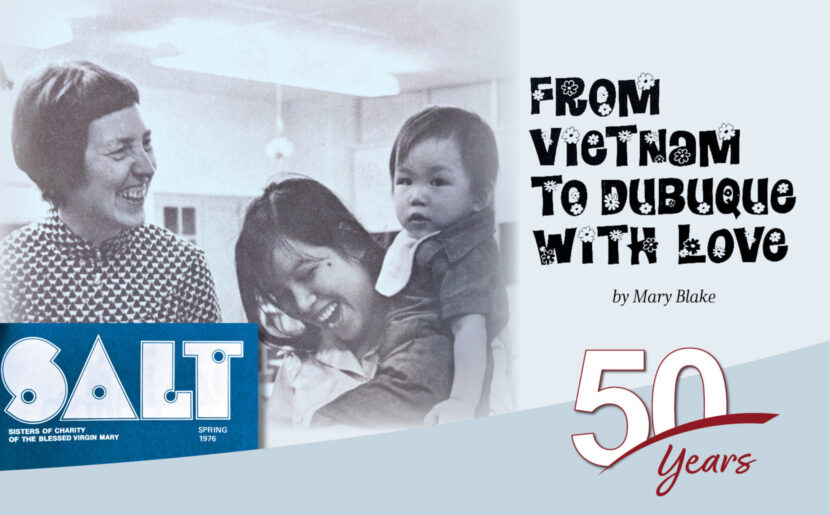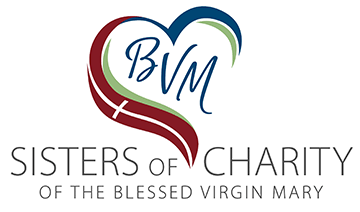From Vietnam to Dubuque With Love

By Mary Blake
Published in Salt magazine, Spring 1976
Clarke College students and faculty have been helping Dubuque’s resident population of Vietnamese in many different ways since the refugees began arriving in the city last summer.
Sponsored by various Dubuque churches, the families came from three resettlement centers across the country, but primarily from Fort Chaffee, AR. About 110 Vietnamese now live in the city, according to a spokesman from Catholic Charities.
At present, two BVMs are teaching an English class two nights a week while Clarke students babysit with the children of adults in the class.
A group of food/nutrition majors recently completed a series of weekly evening lessons on American foods and basic nutrition as part of a course on American style family living for the Vietnamese.
And Phoenix, the Christian service group on campus, sponsored a Mass and reception during January which some 25 families attended.
Area One Vocational-Technical School in Dubuque is sponsoring English classes for Vietnamese residents two evenings per week (it had been three evenings a week last fall).
Sister Eileen McGovern, BVM, professor of sociology, saw an article in the newspaper about the need for English teachers for the Vietnamese. “I invited Sister Catherine Leonard, BVM, professor of psychology, to come with me to the organizational meeting,” she said.
Eileen had spent six years in South America teaching at Jesuit universities in Bogota, Colombia, and Salta, Argentina. The first few years she taught English at the Bogota university.
“You can use the same techniques and types of drill in teaching English no matter what the original language of your students,” she explained.
After some preliminary orientation sessions, English classes for the Vietnamese began the last of September and met three evenings a week at Dubuque Senior High School.
Other teachers in the Area One evening classes included a student at Wartburg Theological Seminary and a students and his wife from the University of Dubuque Theological Seminary.
“It soon became apparent that there was a wide range of English expertise among the Vietnamese attending the classes,” Eileen said. “In fact, there were quite a few who didn’t know any English at all.”
So the teachers divided the students, eventually into three classes. Eileen and Catherine shared the teaching of those with the least knowledge of the English language.
“We began by building vocabulary with pictures from the Peabody Kits in Clarke’s education curriculum lab” Eileen explained. “Then we advanced to simple sentences using the vocabulary pictures.”
Both emphasized that they found it important to drill over and over again with the pictures as they introduced more and more words into their students’ vocabularies.
“In order to make sure they understood verb changes, we would use substitution exercises,” Eileen noted.
“They had a lot of trouble with frequency words,” Catherine added. “Words like ‘always’ and ‘never’ weren’t hard, but how do you differentiate between ‘frequently,’ ‘usually’ and ‘often?’”
Sometimes the vocabulary cards just weren’t adequate. “The students wanted to learn ‘Jingle bells’ before Christmas,” Catherine said. “So we tried to explain the lines, ‘Dashing through the snow in a one-horse open sleigh.’ There was a picture of a horse among the cards, we drew a sleigh on the blackboard and by that time they’d seen snow.”
The lessons included a lot of laughter as well as serious drill, both instructors indicated.
“The students would laugh at long words,” Catherine said, “and I just about brought down the house when I tried to pantomime an oil can by pretending to oil the hinges on a squeaky door.
“Every now and then they would turn the tables on us and try to get us to pronounce Vietnamese names,” she added.
After the first of January the evening sessions were shortened to two nights a week, which both sisters admitted was a relief for them and the other teachers. “The students were very faithful in attendance,” Catherine said. “We had no motivational problem at all. But they did get tired and began to have other evening commitments.”
Both emphasized that their class members have made good progress. “It used to be that we couldn’t talk with them at all and now we converse with each other about lots of different things,” Eileen said.
“It is fun to watch one person catch on to what he or she thinks we are saying,” Catherin added, “and then explain to the rest of the class in Vietnamese. We can only hope the impression is correct.
“They’re a marvelously polite people,” she said, “but they aren’t passive. They’ll ask questions to make a point clear. We found if we said something over and over again using different words each time that eventually they would understand.”
David harms, coordinator of adult education for Area One, expects the English lessons to continue until summer, at which time the students will be surveyed to discover their preference for a continuation of study or a vacation.
“The program is funded through the Adult Basic Education Act, a federal program administered by the state,” he said, “and depending on funding we hope to start the English lessons again in the fall.”
While the English lessons continued, first three times and now twice a week, the Dubuque County Agricultural Extension Service was conducting a different group of classes on yet another night.
The American style family living series, coordinated by Marilyn Olson, home economist with the extension Service, introduces the Vietnamese to a bewildering array of American customs and activities.
Clarke students, under the direction of Barbara Schick, chairperson of the food/nutrition department, were asked to provide basic instruction in food preparation.
The sessions are to help the refugees with problems of purchasing and preparing American foods,” Mrs. Schick said, “and also to introduce them to concepts of good nutrition.”
Two senior food/nutrition majors, Joanne Minnehan of Churdan, IA, and Margaret Oberfell of McGregor, IA, who had begun an independent study in nutrition education, took on the lesson planning for the weekday sessions, while a third, Marlene Klinck of Chicago, conducted the classes with help from additional food/nutrition majors.
Other students, members of Phoenix, the Christian service organization on campus, had decided last semester after a brainstorming session on future projects, to help Dubuque’s Vietnamese in some way.
The idea of a Mass, to be celebrated in Vietnamese, with a reception following, evolved later, according to Trudy Shaw, junior from Fort Dodge, IA, and a member of the Phoenix steering committee.
Held January 17, the Mass was celebrated by a Vietnamese priest who is residing at St. Anthony’s parish in Dubuque. Some 20 students and faculty helped plan the events and serve at the reception.
Trudy also organized the sing0up sheet for babysitters to look after the Vietnamese children while their parents and older brothers and sisters were in English lessons.
“I has been such a help to have the Clarke students,” Eileen said. “The little children had been very distracting and now they’re being entertained while their parents learn.”
Both Eileen and Catherine feel some frustration in their class. “It would be interesting to know more about the Vietnamese culture,” Catherin said, “but we’re still limited to basic English.” Added Eileen, “There’s so much I’d like to learn about their language, but the reason I’m in the class is to help them learn English.”
Both also admit to a sense of urgency in their teaching. “There’s so much they need to know,” Catherin said, “and the program might not be funded another year.”
“But they are progressing,” Eileen concluded. “They’re acquiring the language to deal with real situations as they develop a new life far from their original home.”
At the time of this article, Ms. Mary Blake was Director of Public Relations at Clarke College, Dubuque, Iowa.
Photos by Helen Humeston, BVM
